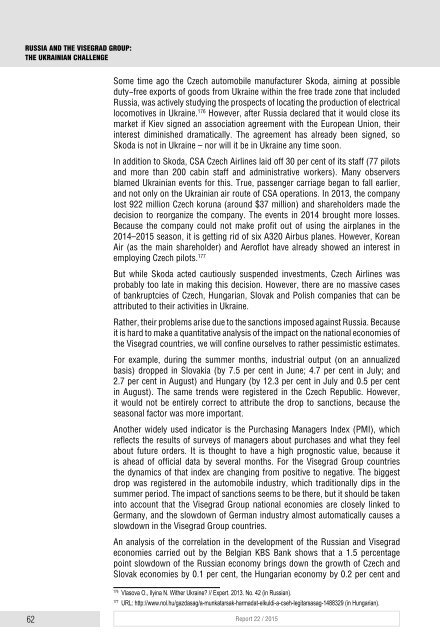RIAC-Visegrad-Report22-Eng
RIAC-Visegrad-Report22-Eng
RIAC-Visegrad-Report22-Eng
Create successful ePaper yourself
Turn your PDF publications into a flip-book with our unique Google optimized e-Paper software.
RUSSIA AND THE VISEGRAD GROUP:THE UKRAINIAN CHALLENGESome time ago the Czech automobile manufacturer Skoda, aiming at possibleduty-free exports of goods from Ukraine within the free trade zone that includedRussia, was actively studying the prospects of locating the production of electricallocomotives in Ukraine. 176 However, after Russia declared that it would close itsmarket if Kiev signed an association agreement with the European Union, theirinterest diminished dramatically. The agreement has already been signed, soSkoda is not in Ukraine – nor will it be in Ukraine any time soon.In addition to Skoda, CSA Czech Airlines laid off 30 per cent of its staff (77 pilotsand more than 200 cabin staff and administrative workers). Many observersblamed Ukrainian events for this. True, passenger carriage began to fall earlier,and not only on the Ukrainian air route of CSA operations. In 2013, the companylost 922 million Czech koruna (around $37 million) and shareholders made thedecision to reorganize the company. The events in 2014 brought more losses.Because the company could not make profit out of using the airplanes in the2014–2015 season, it is getting rid of six A320 Airbus planes. However, KoreanAir (as the main shareholder) and Aeroflot have already showed an interest inemploying Czech pilots. 177But while Skoda acted cautiously suspended investments, Czech Airlines wasprobably too late in making this decision. However, there are no massive casesof bankruptcies of Czech, Hungarian, Slovak and Polish companies that can beattributed to their activities in Ukraine.Rather, their problems arise due to the sanctions imposed against Russia. Becauseit is hard to make a quantitative analysis of the impact on the national economies ofthe <strong>Visegrad</strong> countries, we will confine ourselves to rather pessimistic estimates.For example, during the summer months, industrial output (on an annualizedbasis) dropped in Slovakia (by 7.5 per cent in June; 4.7 per cent in July; and2.7 per cent in August) and Hungary (by 12.3 per cent in July and 0.5 per centin August). The same trends were registered in the Czech Republic. However,it would not be entirely correct to attribute the drop to sanctions, because theseasonal factor was more important.Another widely used indicator is the Purchasing Managers Index (PMI), whichreflects the results of surveys of managers about purchases and what they feelabout future orders. It is thought to have a high prognostic value, because itis ahead of official data by several months. For the <strong>Visegrad</strong> Group countriesthe dynamics of that index are changing from positive to negative. The biggestdrop was registered in the automobile industry, which traditionally dips in thesummer period. The impact of sanctions seems to be there, but it should be takeninto account that the <strong>Visegrad</strong> Group national economies are closely linked toGermany, and the slowdown of German industry almost automatically causes aslowdown in the <strong>Visegrad</strong> Group countries.An analysis of the correlation in the development of the Russian and <strong>Visegrad</strong>economies carried out by the Belgian KBS Bank shows that a 1.5 percentagepoint slowdown of the Russian economy brings down the growth of Czech andSlovak economies by 0.1 per cent, the Hungarian economy by 0.2 per cent and176Vlasova O., Ilyina N. Wither Ukraine? // Expert. 2013. No. 42 (in Russian).177URL: http://www.nol.hu/gazdasag/a-munkatarsak-harmadat-elkuldi-a-cseh-legitarsasag-1488329 (in Hungarian).62 Report 22 / 2015


